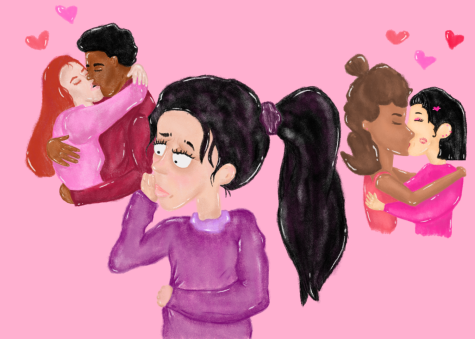‘I just feel left out’: Asexual-identifying students balance identity and misconceptions
February 8, 2022

When first-year film and television major Charlie Warren came out as asexual, they were in the car with their mom. “So you’re gay?” Warren’s mom responded.
“I had to explain to her I was still interested in guys, but I didn’t want to have sex with or wasn’t attracted to them,” Warren said. “She still didn’t really understand it.”
The term asexuality describes someone who has never had sexual attraction for others. Asexuality is closely related to aromanticism, which refers to someone who does not experience any romantic attraction. Outside of these two, there is a spectrum of how someone may identify sexually or romantically, or how they express intimacy.
Warren also identifies as gray-sexual, which is an umbrella term for someone who falls within the gray area of asexuality and aromanticism, as they “sometimes, occasionally or rarely experience sexual attraction.”
Valentine’s Day and the days leading up to it tend to be centered on how an individual will celebrate when accompanied by a partner. Whether that be platonically or sexually, 52% of Americans said they would celebrate Valentine’s Day in 2021, according to Statista.
“I think society puts a big importance on sex when there really shouldn’t be any,” said Noey Budde, a junior music major.
Budde identifies as demi-sexual and only feels sexual attraction toward someone after forming an emotional connection with them.
“With Valentine’s Day and [movie] genres like romance and rom-coms, the importance of the film is when the protagonists have sex, and I always found that to be so dumb and weird,” Budde said.
Kari Holman is a licensed clinical professional counselor, a national certified counselor and a level-two certified clinical trauma professional who also identifies as asexual. She said many people equate sex and love, but they are different.
“Valentine’s Day is about love,” Holman said. “It’s not about sex. Focus on your love and the people you love.”
Individuals who identify as asexual have other ways of expressing their love for someone that doesn’t involve sexual activity. Budde said they enjoys cuddling, and it is one of the most romantic activities for them.
“I’d love to meet someone and, you know, take them out for Valentine’s Day, but I’d have to come out to these people and [say], ‘I’m not going to take you home.’ [Sex] is mostly what they would want, and that’s fair, but, I just feel left out,” said Lex Romero, a first-year film and television major who is asexual.
Holman said one of the biggest misconceptions about asexuality is that it originates from the traumas of sexual abuse or assault.
“Sex and rape are two different things,” Holman said. “If so many other people who do experience rape and still have sexual desire, it doesn’t add up that somebody else would be sexually assaulted and then they suddenly have no desire.”
Romero said this assumption frustrates her, as she was sexually assaulted after coming out as asexual in the seventh grade.
Outside of the misconceptions that come with being asexual, the societal pressure to love sex puts asexuals in an awkward place. Both Romero and Budde said they experience discomfort when they are around friends who discuss their sex lives and hooking up.
“I definitely feel uncomfortable [having that conversation], and I feel so bad about it because they’re my friends,” Romero said. “If that makes them happy, that’s great, but as they tell me, I’m just mentally like, ‘ew,’ and I feel bad.”
As Feb. 14 approaches, for asexuals and gray-sexuals like Warren, it’s just another day.
“I treat it like it’s Easter,” Warren said. “It’s there, and if I get some cool chocolates from it, that would also be nice.”







